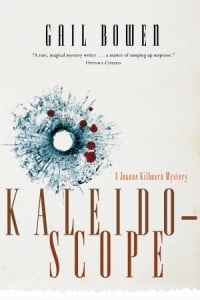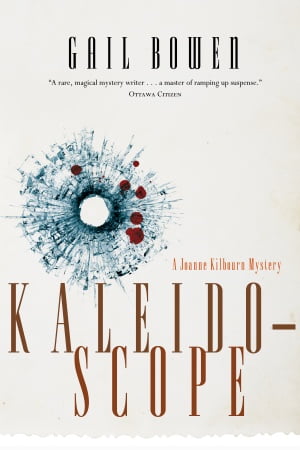In Kaleidoscope, the thirteenth book in Gail Bowen’s Joanne Kilbourn mystery series, released last month, Joanne retires. Happily settled with her husband Zack Shreve and their 14 year-old-daughter Taylor, and at last liberated to take daytime naps, her prospects for a cozy retirement are good. But the trials of her neighbours, blistering unhappily in situations caused by wealth inequality, threaten the Shreves’ domestic bliss; anger bubbles up through the seams of their lives and shakes them free of the embrace of their privileged lives. In anticipation of her appearance tonight as a part of the Toronto Public Library’s eh List, the Toronto Review of Books spoke to Bowen about, among other things, the broad shift occurring in the Shreves’ lives, how they have been pressed towards social action, and whether or not their fictional world – one that is not just tolerant of but embraces those who might otherwise occupy the margins – is realistic.
 TRB: There is a moment in the book where Joanne tenderly and very perceptively describes Taylor’s friend Isobel as a girl who is “quick to sense the moods of others.” That is a good example of a moment in which Joanne displays her sharp intuition. Do you think that there is something about a mother’s way of seeing other people and the world that lends itself to detective work?
TRB: There is a moment in the book where Joanne tenderly and very perceptively describes Taylor’s friend Isobel as a girl who is “quick to sense the moods of others.” That is a good example of a moment in which Joanne displays her sharp intuition. Do you think that there is something about a mother’s way of seeing other people and the world that lends itself to detective work?
Gail Bowen: Yes, I think maybe almost women in general tend to walk into a situation and read the situation carefully. And I don’t know whether it’s because those of us who are mothers are mothers and we just are trying to look over at the larger picture. I said to somebody the other day, just at a kid’s party, that all I ever hoped for was that nobody would throw up and nobody would cry. And you spend your whole time, trying to make sure that it’s working for everybody and I think that kind of wide vision is something that is good for a detective, because they are aware of everything that is going on, not just what is in it for me, but what’s the larger picture.
TRB: Is her skill as a sleuth also related to the fact that she is very at the centre of this large network of characters? It’s as if she is at the centre of a wheel.
Gail Bowen: It’s partly just Joanne’s personality. She is someone who really is interested in other people. Other people matter to her, and I think, you can tell from the book, not just others who are connected to her by blood, but in the sense of how they are connected to her by the fact that we are all citizens of the world. She feels that kind of connection. To me, the moment in Kaleidoscope that just broke my heart, was when the little girl was thrown out of the car. I just wept when I wrote that, but I actually know that happens 10 minutes from my beautiful life in Lakeview, and it’s awful.
TRB: Is the kaleidoscope image about that sense of connection?
Gail Bowen: It’s about the fact that it is so random. I think too many of us believe that the fact we are successful, or that our lives are good, is something that we have done ourselves, and that is there, but the truth is that the start you get [in life] is very random. I read once that someone said that the biggest lottery that any of us will ever be involved in is the day the sperm hits the egg. And it’s true. So much of your life is decided in that moment. It behooves those of us who have been born with all of the possibilities there, and people who are there to help us realize those possibilities – it’s our obligation to try and redress the balance.
TRB: I think that’s what ultimately happens when Zack [Joanne’s husband] leaves the law firm [to work on the Village Project full-time].
Gail Bowen: Yes, and in the next book, they are really working at this, and it does change their lives. It’s really a question of leaving behind a very comfortable world. It’s not just the money. It’s the fact that your worries can be very personal, and all of a sudden, your concerns are for everyone. That means that you’re never going to sit back anymore – that’s it.
TRB: Where did the idea for the Village Project come from?
Gail Bowen: Every city, I think, numbers of cities have these large plans for reclaiming downtown areas. But I didn’t want it to be the white hats, black hats sort of thing [where] somebody’s all good, and somebody’s all bad. There is right on both sides here. There is something in Leland Hunter’s dream of making the city a place where people can buy vegetables, and mixed income housing, and that’s a good dream. The fact that there is no sense at all of what’s going to happen to the people who are displaced, is terrible. And one of the lines I actually heard from a real person, when Joanne calls Leland Hunter on this and says, “What about the people who won’t have a home?” and he says, “Well, there are always casualties,” and then moves right along. I think that’s just unacceptable.
TRB: In some ways, Joanne’s own village, the one that is inhabited by her closest family and friends, is the kind of village that we all are striving towards: her husband suffers from paraplegia but he is not only viewed as able-bodied, but as being an effective trial lawyer, father and husband; to the next side of her, she has Ed and Barry who are married in this book and they are not only married and tolerated, they are supported. There is a very particular scene in which they are pulled onto the dance floor away from the edges they have been occupying, and encouraged to dance freely together at the Wadena wedding.
Were you consciously trying to set forth this village where there is a lot of acceptance? Joanne’s motto is that a “greater security for anyone of us lies in greater abundance for all of us,” but it is also a greater abundance of acceptance.
Gail Bowen: That’s a very good point, and Joanne’s world, to be honest, is very much like my world. And I know it seems unrealistic, but it’s not. I certainly have watched the whole shift in views toward gay and lesbian people. And I always – my kids will get very impatient about the fact that there was prejudice when they were young towards gays and lesbians – and I say, “We move incrementally, but we move,” and this is a generational thing. And it has turned out that that’s the case. I’ve always said to them, “listen, our generation, we’re the ones who are the bigots, but your generation, and of course now, our generation, my generation is learning.” Finally, President Obama says that gays can marry and it was one of those things where you have to stand up for what you believe in, ultimately, and you have to act in what you believe in. I think that is the way where hope is, trying to move in that direction.
Gail Bowen will be appearing tonight (Thursday, May 24) at TPL’s Runnymede (2178 Bloor Street West), from 7-8:30 pm.
